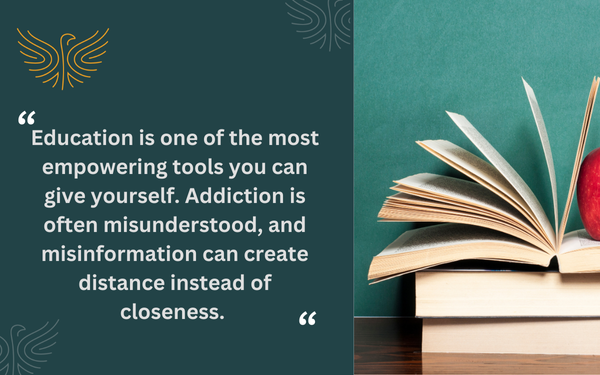Siblings often know us in ways no one else can. They’re the ones who grew up alongside us—sharing bedrooms, inside jokes, family traditions, and sometimes even rivalries. This closeness makes supporting a brother or sister in recovery both powerful and complicated.
Unlike friends or parents, siblings often straddle the line between confidant and peer, carrying decades of shared history that can shape how recovery unfolds. Then, when addiction enters the picture, those bonds can be tested. You may feel pulled between love, frustration, protectiveness, or even grief.
But when your sibling steps onto the path of recovery, you have the chance to play an irreplaceable role, offering encouragement rooted in shared experiences and trust built over a lifetime. So, let’s explore how siblings, like yourself, can walk alongside one another in recovery with compassion, patience, and hope, while also protecting their own well-being along the way.
_______________________________________________________
How to Support Your Sibling During Recovery
Supporting a sibling in recovery is rarely simple. You may feel a mix of love, hope, worry, or even frustration as you watch them rebuild their life.
The good news is that there are many meaningful ways you can support them. Below are practical, compassionate strategies to guide you in offering that steady support while also maintaining healthy boundaries.
Learn About Addiction and Recovery
Education is one of the most empowering tools you can give yourself. Addiction is often misunderstood, and misinformation can create distance instead of closeness.

So, take time to read about substance use disorders, treatment methods, and the recovery journey. Many rehab centers offer family education programs designed for this purpose. When you understand that recovery is not about “willpower” but about healing both body and mind, you can approach your sibling with patience instead of judgment.
Communicate with Compassion
Open and honest communication is the foundation of strong sibling support (and any relationship!). Yet, it can be tempting to lecture or try to “fix” your sibling.
Instead, practice active listening: make eye contact, reflect back what they say, and resist interrupting. Let them know you value their perspective even when you don’t fully agree.
And keep in mind that compassionate communication doesn’t mean ignoring tough truths, but it does mean speaking with respect and avoiding shaming language.
Encourage Healthy Routines
Healthy routines provide structure and stability, which are especially valuable during recovery. So, how can you incorporate this as part of your support? Well, keep it simple, and invite your sibling to join you for activities that nurture both body and spirit—whether that’s cooking a nourishing meal, taking a daily walk, or practicing yoga together.
Even small, consistent rituals can restore a sense of balance and create moments of joy. Encouraging healthy habits also rebuilds your bond as siblings. You’re not just supporting their recovery—you’re creating new, positive memories that reinforce connection and hope.
Support Without Enabling
One of the hardest lessons for loved ones is recognizing the difference between support and enabling. At the end of the day, true support means celebrating progress, offering encouragement, and providing practical help such as driving them to appointments or reminding them of meetings.
Enabling, however, involves shielding them from consequences—covering up mistakes, making excuses, or repeatedly providing money without accountability.
While it may feel compassionate in the moment, enabling can slow recovery and damage trust. Holding boundaries can be difficult, but it demonstrates love in a way that ultimately empowers your sibling to take responsibility for their choices.
Respect Their Process
Recovery is deeply personal. It doesn’t follow a straight line, and setbacks can happen.
Thus, respecting your sibling’s process means allowing them to move at their own pace, even if it’s slower than you’d like.
At the same time, celebrate the victories, however small, and remain steady through challenges. Relapse, while discouraging, is often part of long-term recovery. By showing patience and unconditional support, you remind your sibling that their identity is not defined by a single slip but by their continued effort and courage to keep trying.
Celebrate Milestones and Progress
Recovery is full of small wins that deserve recognition. Whether your sibling has been sober for one week, one month, or one year, celebrating these moments reinforces their progress and boosts motivation.
Encourage Professional and Peer Support
As much as you want to be there for your sibling, it’s important to recognize that recovery thrives on a community of support. Encourage your sibling to stay connected with professional resources such as counselors, therapists, or their rehab team.
Peer support groups, such as Alcoholics Anonymous (AA) or Narcotics Anonymous (NA), can also provide accountability and fellowship. Your encouragement in seeking these connections shows that you respect the process and recognize that recovery is a journey best walked with many helping hands.
Model Self-Care and Balance
Sometimes the best way to support your sibling is by modeling healthy behavior yourself. When they see you prioritizing rest, exercise, and emotional well-being, it reinforces the idea that recovery is about creating a balanced, sustainable lifestyle.
Additionally, modeling self-care helps prevent burnout, ensuring you remain strong enough to offer support when it’s truly needed. In this way, your care for yourself becomes another form of care for your sibling.
_______________________________________________________
Moving Forward Together
While you can’t walk the path for them, your steady presence, compassion, and encouragement can make an enormous difference. By educating yourself, setting healthy boundaries, and celebrating their progress, you show your sibling that they are not alone.
At the same time, caring for your own well-being ensures you have the strength to keep showing up with love. Recovery is rarely a straight line, but with patience and support, it can become a shared path toward healing and hope—for your sibling, and for your family as a whole.
If you’re worried about yourself or someone you love, Freedom Recovery Centers (FRC) is here to help. Call us at 804-635-3746 or fill out our online form to learn more about our programs and how to get started.
.svg)






.svg)

.svg)



.svg)
